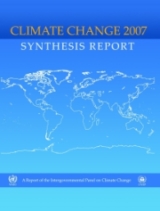Mexican scientists and institutions involved in the IPCC (Intergovernmental Panel on Climate Change)
The 4th Assessment Report (2007) of the IPCC (Intergovernmental Panel on Climate Change) involved the contributions of 2,500 scientists from 130 countries. The number of Mexican scientists participating was higher than the number from many richer countries including Spain and France. Sixteen Mexican scientists were involved in writing the 4th IPCC report. Ten of the sixteen hold positions at UNAM (the National University in Mexico City), making UNAM one of the institutions in the world with the highest rate of participation.
The 16 Mexican contributors were:

- Mario Molina (Nobel prize-winning atmosphere scientist), Centro Mario Molina, wrote the synthesis for policy-makers
- Carlos Gay, Centro de Ciencias de la Atmósfera, UNAM, coordinator of chapter 13, Latin America
- Victor Magaña, Centro de Ciencias de la Atmósfera,UNAM (Climate models)
- Francisco Estrada, Centro de Ciencias de la Atmósfera,UNAM (Climate models)
- Graciela de la Raga, Centro de Ciencias de la Atmósfera,UNAM
- Cecilia Conde, Centro de Ciencias de la Atmósfera,UNAM (Adaptation and agriculture)
- Blanca Jiménez. Instituto de Ingeniería, UNAM (Freshwater)
- Claudia Sheinbaum, Instituto de Ingeniería, UNAM
- Ana Rosa Moreno, Facultad de Medicina, UNAM (Human health)
- Omar Masera, Centro de Investigaciones en Ecosistemas, UNAM, coordinator of the chapter on forestry
- Carlos Anaya, UNAM (Forestry)
- Edmundo de Alba, Instituto Nacional de Ecología (INE), Vice-president of the group evaluating vulnerability, impacts and adaptation
- Patricia Romero, Universidad Autónoma Metropolitana (UAM) Xochimilco, coordinator of chapter 7, Industry and Society
- Ricardo Zapata, CEPAL (Economic costs of adaptation and agriculture)
- Jorge Gasca, Instituto Mexicano del Petróleo (Energy)
- Antonina Ivanova, Universidad Autónoma de Baja California Sur
A further 8 Mexican scientists helped edit the documents:
- Oralia Oropeza, UNAM
- Enrique Martínez-Meyer, UNAM
- Álvaro Osornio Vargas, UNAM
- Julia Martinez, INE
- Andrés Flores Montalvo, INE
- Arnoldo Matus Kramer, INE
- Francisco Aguayo, El Colegio de México
- Daniel Lluch Belda, Centro Interdisciplinario de Ciencias Marinas, Instituto Politécnico Nacional (IPN).
Many of the same scientists have now been confirmed as members of the international team developing the 5th Assessment Report of the IPCC. In addition, the following newcomers have also been appointed:
- Salvador Lluch-Cota, Centro de Investigaciones Biológicas del Noroeste, S.C. (Lead author, Ocean systems)
- Fernando Aragon, El Colegio de la Frontera Sur (Urban areas)
- Ursula Oswald-Spring, Centro Regional de Investigaciones Multidiscipinarias, UNAM (Human security)
- Roberto A. Sanchez Rodriguez, University of California, Riverside (Adaptation planning and implementation)
- Edgar Ortiz (Integrated Risk and Uncertainty Assessment of Climate Change Response Policies)
- Martha Micheline Cariño Olvera (Social, Economic and Ethical Concepts and Methods)
- Mauricio de María Campos (Sustainable development and equity)
- Angel de la Vega (Energy systems)
- Xochitl Cruz-Nuñez (Transport)
- Omar Masera (Agriculture, Forestry and other land uses)
- Gian Carlo Delgado (Human Settlements, Infrastructure and Spatial Planning)
- Alba Eritrea Gámez Vázquez (Regional Development and Cooperation)
- Manuel Angeles (National and Sub-National Policies and Institutions)
- Tomás Hernández-Tejeda, National Institute of Research in Forestry, Agriculture and Livestock (INIFAP)/SAGARPA (Synthesis Report)
Mexico’s diverse climates are the subject of chapter 4 of Geo-Mexico: the geography and dynamics of modern Mexico. Water availability, rivers, aquifers, water issues and hazards are analyzed in chapters 6 and 7. Buy your copy today!
One Response to “Mexican scientists and institutions involved in the IPCC (Intergovernmental Panel on Climate Change)”
Sorry, the comment form is closed at this time.
Of the 16 Mexican participants, seven are women. While that is one less than half, it is impressive.